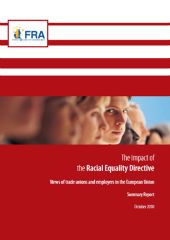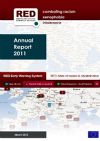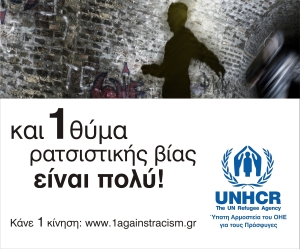The impact of the Racial Equality Directive - Views of trade unions and employers in the European Union
Strengthening the fundamental rights architecture in the EU IVΜάιος 7, 2010 - European Union Agency for Fundamental Rights
Σχετικοί σύνδεσμοι (εξωτερικοί):
This report constitutes one part of the FRA's interdisciplinary research on the impact of the Racial Equality Directive. The Racial Equality Directive (2000/43/EC) is the key piece of EU legislation combating discrimination 'on grounds of race or ethnic origin'. It prevents unfavourable treatment based on race or ethnic origin in the areas of employment, education, social protection including social security and healthcare, and in access to and the supply of goods and services, including housing. The present report focuses on the views of Europe's employer organisations, trade unions and non-governmental organisations (NGOs) concerning the application of the directive in practice, with a sole focus on the area of employment.
Background
The Racial Equality Directive was adopted in 2000 and had to be transposed into each Member State's national legislation by 2003 (slightly later for the Member States that joined the EU in 2004 and 2007). The Directive has been transposed into the national law of all Member States, although shortcomings in the transposition have been noted in some countries. The Directive invites the Fundamental Rights Agency (FRA) to contribute to the European Commission's reporting on its impact on the ground. This report is the first in a series of reports to be issued by the Fundamental Rights Agency in 2010 on the impact of the Directive.
Key findings
The Racial Equality Directive protects everyone in the EU
Respondents said that there was a common misconception among the public that the Racial Equality Directive gives protection only to migrant workers, while in reality it covers everyone in the European Union.
Trade unions and employers are encouraged to work together to combat racial and ethnic discrimination
Respondents viewed the EU as an important source of support for joint interventions between the social partners (trade union and employers' organisations), as well as for initiatives in individual workplaces and with civil society.
Race equality more difficult to sell than gender equality
Trade union respondents from France and Denmark said that activities to promote gender equality in the workplace are more accepted than activities to prevent racial discrimination.
Discrimination against the Roma often not seen as racial discrimination
Racial discrimination against the Roma was not acknowledged as such by many employer organisation and trade unions respondents.
Awareness levels of the Directive vary
Trade union respondents were generally more aware of the Directive than respondents from employers' organisations. Awareness levels of the Directive were generally higher among respondents from EU15 Member States than among those from most of the EU12.
ΔΗΜΟΣΙΕΥΣΗ
-
 i-RED Ετήσια Έκθεση 2011
i-RED Ετήσια Έκθεση 2011
Μάρτιος 25, 2012

 RED Annual Report 2011
RED Annual Report 2011
